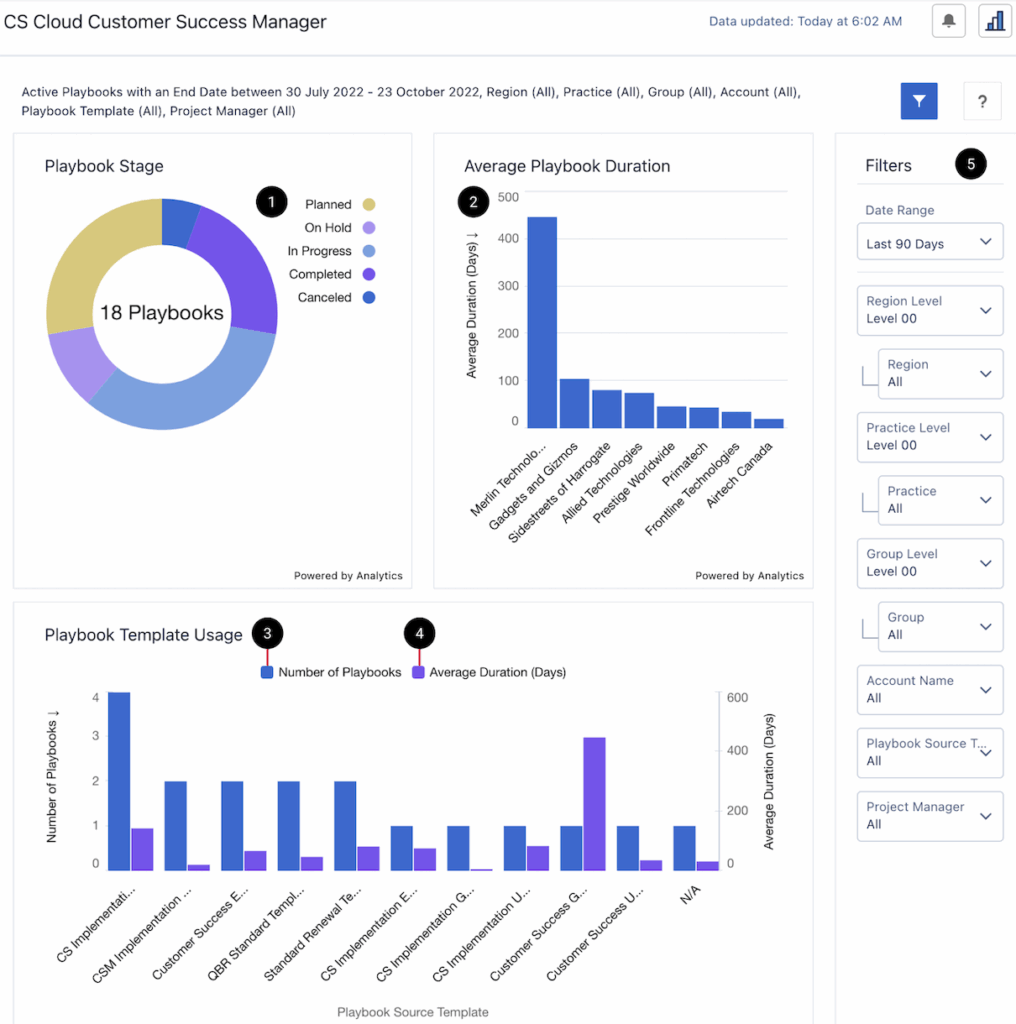Customers are the lifeline of any business, and managing their success is critical to driving growth and operational efficiency—especially for service-based organizations. Renewals and subscriptions often serve as the most telling benchmarks of customer success. And behind every renewal is a trail of interactions—each one with the power to strengthen or strain the customer relationship.
Enter Certinia Customer Success (CS) Cloud—a powerful solution designed to enhance satisfaction, boost renewals, and deliver a seamless, unified customer experience. Built on the Salesforce Customer Success Platform, it empowers businesses to orchestrate success across the entire customer lifecycle, nurturing loyalty and long-term engagement.
In today’s competitive landscape, customer success isn’t just a support function—it’s a strategic growth driver. To harness its full potential, organizations must eliminate internal silos and create a culture of collaboration. Certinia Customer Success software enables this by offering complete visibility into the customer journey and aligning key metrics such as revenue streams, resource demand, and capacity.
In this blog, we’ll dive deeper into Certinia Customer Success Cloud—its features, its impact, and how it can reshape your approach to customer success. But first, let’s explore the core strategies that fuel long-term customer success.
Laying the Foundation for Customer Success
Assessing the Customer Success Strategy
Customer success is no longer optional—it’s essential for modern businesses striving for sustainable growth and long-term loyalty. But before diving into the core strategies that drive impactful outcomes, organizations must take a step back to assess their current capabilities. Identifying strengths and pinpointing gaps is key to unlocking the full potential of the Customer Success Cloud—enabling improvements across people, processes, and technology, while fostering a truly customer-centric culture.
To get started, here are some critical questions every organization should ask:
- Team Structure: What does the current customer success team look like? Are roles and responsibilities clearly defined?
- Cross-Team Collaboration: How well do customer-facing teams—sales, service, and success—collaborate? Is information flowing smoothly between them?
- Seamless Transitions: Is there a structured, frictionless handoff process from sales to service to customer success?
- Lifecycle Clarity: Are there well-defined customer lifecycle stages with clear milestones that align with business goals?
- Strategic Playbooks: Are your customer success playbooks based on real feedback and aligned with key customer activities?
- Pipeline Visibility: Do both sales and customer success teams have clear visibility into the renewal pipeline?
- Technology Stack: What customer success tools are in use, and are they effectively supporting the team’s efforts?
- Technology Stack: What customer success tools are in use, and are they effectively supporting the team’s efforts?
- Data Accessibility: Are teams working with siloed data, or is there seamless access to relevant and actionable datasets?
- Data-Driven Decisions: How is customer data being used to shape proactive, personalized, and informed customer success strategies?
Key Drivers to Elevate Customer Success
Delivering exceptional customer experiences requires more than just reactive support—it demands a proactive, strategic approach across people, processes, and platforms. Here are four critical pillars that can help organizations scale customer success and drive long-term value:
1. Champion a Customer-Centric Culture
Customer success begins with a mindset. Cultivating a customer-centric culture means every employee—regardless of role—understands their impact on the customer journey. With shared goals, consistent communication, and a focus on client outcomes, organizations can drive satisfaction and loyalty at every touchpoint.
2. Foster Cross-Functional Collaboration
True customer success is a team sport. It starts with early and ongoing collaboration between sales, customer success, and service teams. Aligning goals, milestones, and key success metrics ensures a smooth handoff, unified messaging, and a consistent experience throughout the customer lifecycle.
3. Leverage the Right Technology Stack
Modern customer success teams thrive on smart tools. By automating workflows, breaking down silos, and enabling real-time data access, the right technology supports efficiency and precision. Dashboards, playbooks, and health scoring models empower teams to proactively manage and scale success efforts.
4. Gain a 360° View of the Customer
A unified, real-time view of each customer unlocks true value. With end-to-end visibility—from onboarding to renewal—teams can respond faster, reduce friction, and make informed decisions. It bridges the front and back office, drives operational efficiency, and maximizes customer lifetime value.
Customer Success Cloud- One Unified Platform to Maximize Customer Value
Certinia Customer Success software, built natively on Salesforce, is designed to give organizations a complete, real-time view of the customer journey—from initial onboarding to renewal, expansion, and beyond. As a customer moves through each phase of the journey, new information is collected and stored in the customer account. It enables businesses to track every phase of the customer lifecycle, store vital customer data, and deliver measurable outcomes, all within a single, connected platform.
When combined with Professional Services (PS) Cloud, the solution becomes even more powerful—allowing organizations to align service delivery with customer success metrics, break down operational silos, and drive revenue growth through a truly collaborative approach. Leveraging CS Cloud allows teams from different departments like sales, finance and professional services to get an end-to-end view of customer activities and provide exceptional experiences.
This single source of truth empowers customer-facing teams with unified visibility, seamless collaboration, and data-driven decision-making. Together, CS Cloud and PS Cloud bring the entire organization into alignment around critical business metrics like resource demand, capacity planning, and revenue realization.

Customer Success Manager Dashboard
Source: CS Cloud Customer Success Manager Dashboard
Key Features of Customer Success Cloud that Drive Proactive Success
1. Track and Measure Customer Success Performance in Real-Time
Customer Success Management can monitor the effectiveness of their initiatives using rich, real-time dashboards. The CSM Workspace provides a holistic view of each account—showcasing task deadlines, engagement activities, and deliverables in a structured grid. With a personalized account view, managers gain quick access to opportunities, open cases, and progress metrics, enabling them to take informed, proactive actions that keep customers on track and satisfied.
2. Build and Manage Goal-Oriented Success Plans
Success starts with clarity. Certinia enables services organizations to design Success Plans that align directly with each customer’s unique objectives. With the Success Tracker, teams can monitor progress against goals, while the Activity Tracker records notes, updates, and account history. This ensures all milestones are met, value is clearly demonstrated, and no detail falls through the cracks.
3. Streamline and Standardize Playbook Management
Operational excellence comes from consistency. Certinia CS Cloud lets teams create, manage, and execute Customer Success Playbooks—task groups designed to guide specific outcomes like onboarding, renewal, or upsell strategies. With a dedicated playbook management interface and a catalog of best practices, CSMs can apply proven strategies across accounts to drive scalable, repeatable success.
4. Optimize Resource Assignment and Utilization
Efficient resource use is critical to delivering value at scale. Through tight integration with Playbook Management, Customer Success software allows managers to assign owners to success plans and specific tasks. By leveraging CS Cloud connectors, CSMs can request subject matter experts and reuse resources across multiple playbooks—ensuring optimal allocation and reducing duplication of effort.
5. Enable Seamless Cross-Team Collaboration
Collaboration shouldn’t stop at internal teams. With Salesforce Experience Cloud integration, customers and internal stakeholders can work side-by-side on playbook tasks. This ensures that everyone involved—across departments and external client teams—is aligned around deliverables, timelines, and shared success goals.
6. Leverage the Full Power of the Salesforce Ecosystem
Built natively on Salesforce, CS Cloud harnesses the platform’s capabilities for automation, integration, and intelligent notifications. Tasks and playbooks can be triggered automatically by customer events, ensuring Customer Success Management receive real-time alerts and can respond instantly to changes in customer behavior or needs. This automation enhances responsiveness and minimizes delays in service delivery.
Summing Up
Managing fragmented customer data across departments is a major challenge for enterprises—leading to missed information, misalignment, and disconnected experiences. Certinia Customer Success Cloud, natively built on Salesforce, solves this by giving teams a unified, real-time view of every customer. And when combined with PS Cloud, it bridges the gap between service delivery and success management—ensuring smooth handoffs, deeper insights, and a truly connected customer journey.
Break down silos and build smarter relationships with Certinia Customer Success Cloud implementation. Ready to get started? Connect with us!
Author

AVP, AblyPro

Murali is the AVP – Certinia at AblyPro with 12+ years of experience in handling complex Certinia and Salesforce applications, implementations, configurations, and customizations. At AblyPro, he has been the pillar of all the Certinia PSA and ERP project deliverables, ranging from design to implementation, project management, and resource management. With years of practical knowledge and expertise in this industry, Murali supports the sales team in strategizing customer solutions to meet the actual business needs of the clients. Murali is a dynamic and experienced professional with multiple Certinia and Salesforce certifications, helping businesses to technically strive in this ever-changing landscape.





